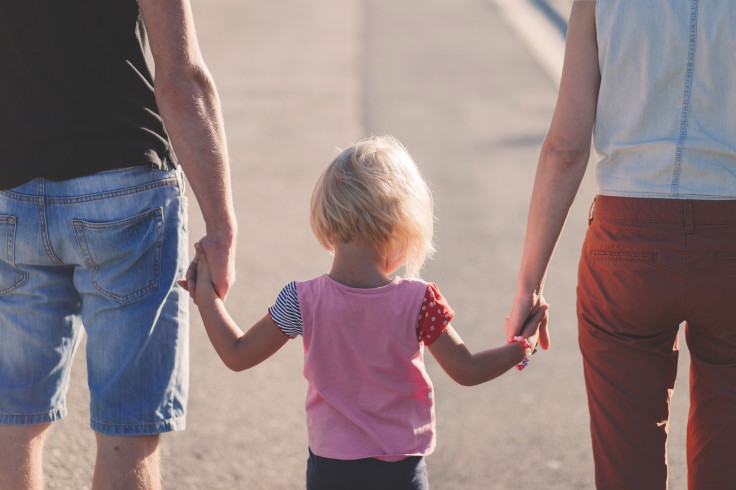Is Your Child Well-Adjusted? Moms, Dads' Views Of Co-Parenting Relationship May Impact Kids: Study
KEY POINTS
- Researchers examined parents' co-parenting patterns and their kids' behavioral adjustment
- Kids fared best when both parents had positive views of their co-parenting relationship
- There's an interesting difference in the impact on kids of couples with moderate co-parenting quality
Does the way parents see each other as co-parents affect their kids' behavioral adjustment? It actually does, a study has found, and the results are quite interesting.
In the study, which was published in the journal Child Development, a team of researchers asked parents of young children about their co-parenting relationship with their respective partners.
"'Co-parenting' refers to the ways in which individuals who share responsibility for raising children relate to one another in their roles as parents," they wrote. "Given co-parenting's central role in family functioning, it is unsurprising that it is significantly associated with children's social–emotional adjustment."
Previous studies have found children of couples with high-quality co-parenting relationships are better adjusted, according to the Ohio State University (OSU). However, these studies were mostly focused on middle-class couples and relied mostly on the mothers' views.
For their work, the team focused on diverse, low-income couples and looked at both the mothers' and fathers' perspectives. The study involved 2,915 low-income couples who all had kids under five years old. They were asked about their co-parenting relationships.
They were to respond to statements like "When I have to make rules for the child(ren), [spouse] backs me up" on a scale of one to four, with one being "strongly agree" and four being "strongly disagree."
Eighteen months after their response, the couples were asked to report on their children's social competence and behavioral adjustment. Unsurprisingly, the kids with the best outcomes were the ones whose both parents had a highly positive view of their co-parenting relationship.
"Co-parents with high-quality relationships provide emotional support to one another and back up each other's parenting decisions," study lead author Sarah Schoppe-Sullivan said in a news release from OSU.
On the flip side, the kids of couples who reported low-quality co-parenting relationships were found to be less well-adjusted.
When it came to couples who found their co-parenting relationships moderately good, there were some interesting differences. The children fared well even when the mothers had a less positive view of the relationship. In fact, they were almost as well-adjusted as the kids whose both parents saw the co-parenting relationship as positive, noted Schoppe-Sullivan.
However, when the couple saw the relationship as moderately good but the dad had a less positive view of the co-parenting relationship, the children had poorer adjustment. The exact reason for this is unclear, researchers said. It's possible that the moms feel the dads aren't contributing enough to parenting but that may not be leading to conflict.
But if the fathers are distressed — dads who had elevated levels of psychological distress were "overrepresented in the 'fathers less positive' group" — the mothers may "close the gate" from parenting duties so as to protect the kids from negative paternal behavior. This may exacerbate the fathers' distress and lead to further conflicts.
"That may lead to more conflict between the parents, more disagreement on parenting decisions, and less positive engagement between fathers and their children," explained Schoppe-Sullivan.
Overall, the team identified four groups: parents with a "highly positive" view of their co-parenting relationship, those with a moderately good quality co-parenting relationship but the mothers had a less positive view, those with a moderately good quality co-parenting relationship but the fathers had a less positive view, and the ones who reported having low-quality co-parenting relationships.
The first two resulted in better outcome for kids, while the other two lead to kids being less well-adjusted.
The good news is that among the four, the largest was the group with both parents having a highly positive view of their co-parenting relationship, comprising 43% of the samples. This is followed by the group with mothers who had the less positive view, comprising 32%.
"Low-income couples often face a variety of challenges that can make parenting more difficult than it is for middle-class couples, so it is encouraging that three-quarters of them had co-parenting relationships that led to good outcomes for their children," said Schoppe-Sullivan.
The results show a potential need for co-parenting-related intervention programs as it can actually impact children's behavioral adjustment.
"Prevention and intervention programs can emphasize that high-quality co-parenting promotes children's social competence, which is increasingly important and valued for success in academic as well as social–emotional domains," the researchers wrote. "The development and implementation of social policies in the U.S. that support new parents to develop high-quality co-parenting relationships, such as paid parental leave for fathers as well as for mothers is warranted."

© Copyright IBTimes 2024. All rights reserved.






















